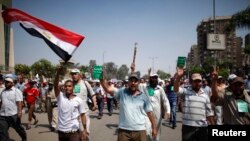The advice comes from Nezar AlSayyad, who predicted ahead of time last week that the Army would oust Morsi and put the chief of the Constitutional Court in as interim president until elections could be held.
“If, in fact, the military is going to be able to control those people in the next may be weeks or 10 days, then I think the transitional government that is going to be put in place right now may be able to function well,” AlSayyad said.
But AlSayyad, head of the University of California Berkeley’s Center for Middle Eastern Studies, said Egypt's Army cannot use too much violence in controlling Morsi's supporters.
“If, in fact, the protests of the pro-Morsi forces continues, or if the military manages to control them, but in a bloody way, then I think that they are likely to go back into hiding as, in fact, the Jamaa Islamiya and the Muslim Brotherhood did, and Egypt is likely to become another Algeria,” AlSayyad said.
He says while the pro-Morsi protesters have a right to demonstrate, calling for a return of the former president and inciting violence is dangerous for Egypt.
“At the moment, they are calling for the return of Morsi,” he said. “At the moment many of them are armed. There’s quite a lot of incitement that is going on, particularly among the pro-Morsi protesters, in a manner that is very unhealthy.
“If they are calling for people to come to the square in defense of Islam, it is in defense of Morsi. If they are calling for people to come because God is asking them to come. If they are calling for people to come because it is their duty to sacrifice their lives for the Morsi cause and what they consider to be their legitimate Islamic state, clearly this is a jihadist mentality, and as far as I’m concerned this is would be deadly for the country,” AlSayyad said.
AlSayyad rejects criticism that the anti-Morsi forces did not seem not to have had a clear succession plan. Instead, he said, anti-Morsi protesters have many plans reflecting the current difficult political climate in Egypt.
He said former U.N. nuclear agency chief, Mohamed ElBaradei, was rejected as the choice for interim prime minister by the Al-Dawa Al-Salafiya and the Islamist Al-Nur groups because he is considered too liberal.
“It had to do with the fact that the Salafists, who were a member of the coalition that accepted the removal of Mr. Morsi, and the Nur party objected to Elbaradei from the perspective that, one, he is from the opposition and they said we want a technocrat, two, that he is a liberal and of course the Salafi party did not want a liberal,” he said.
AlSayyad said the anti-Morsi coalition is considering naming Ziad Bahaa Eldin as prime minister, perhaps within the next 24 hours.
The African Union last Friday suspended Egypt because it considers Morsi's removal a military takeover.
In Washington, President Barack Obama voiced renewed concern about the political upheaval in Egypt while repeating that the United States is not aligned with and does not support any particular Egyptian political party or group.
Republican Senator John McCain has said Washington should suspend U.S. aid to Egypt because the military has overturned a democratically elected president.
AlSayyad said the African Union and Senator John McCain have oversimplified the definition of a military coup. He says while the military might have facilitated the removal of President Morsi, it is not governing Egypt directly.





